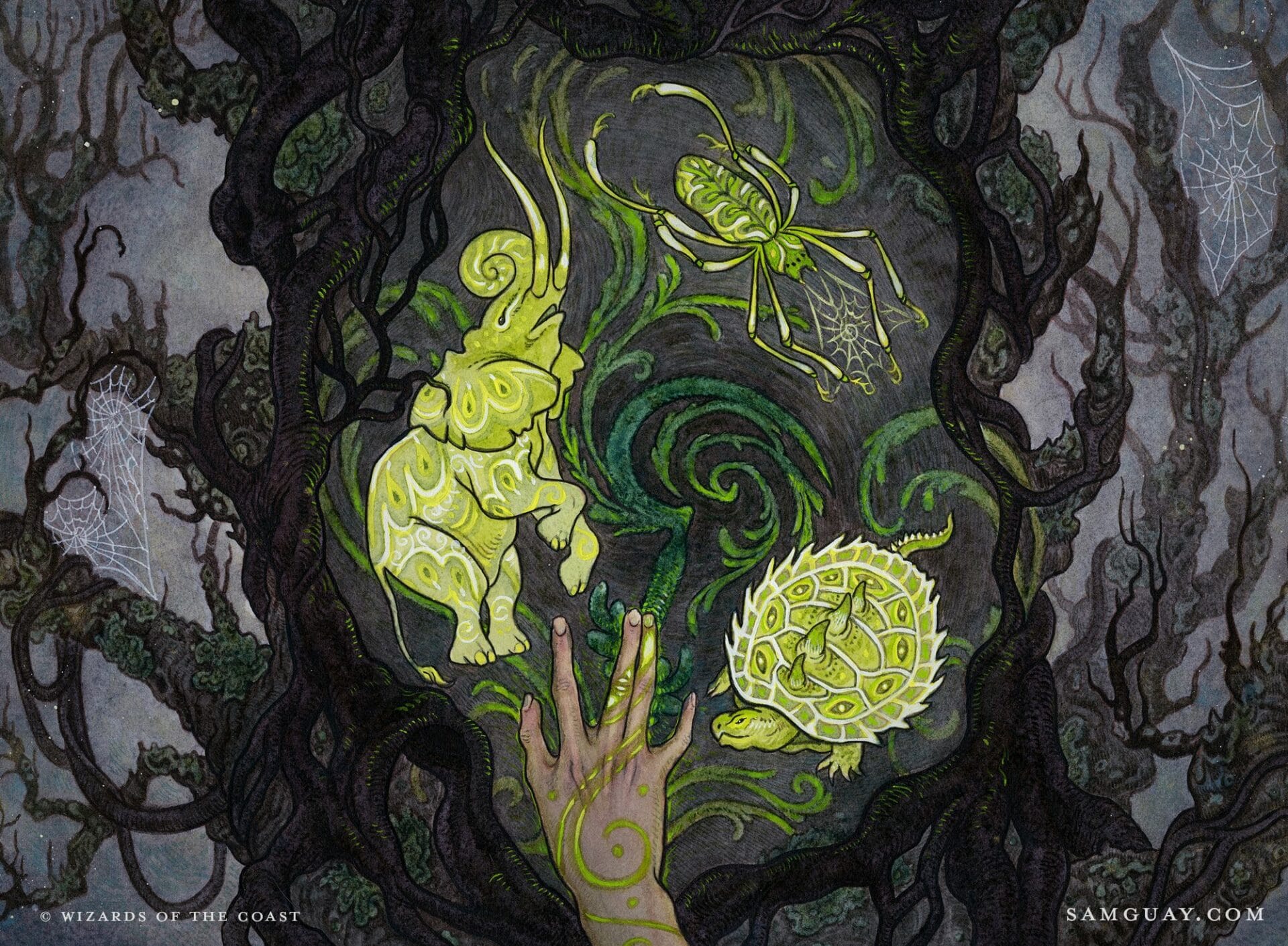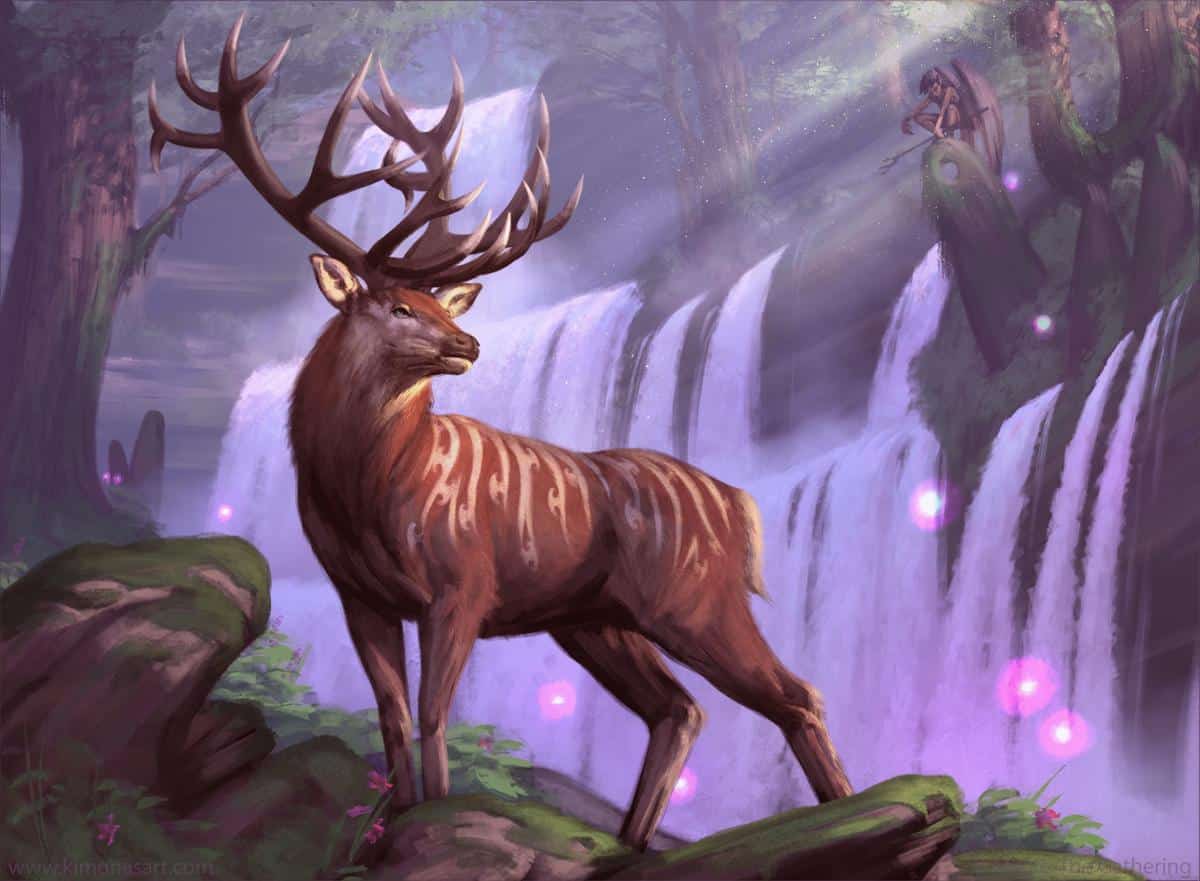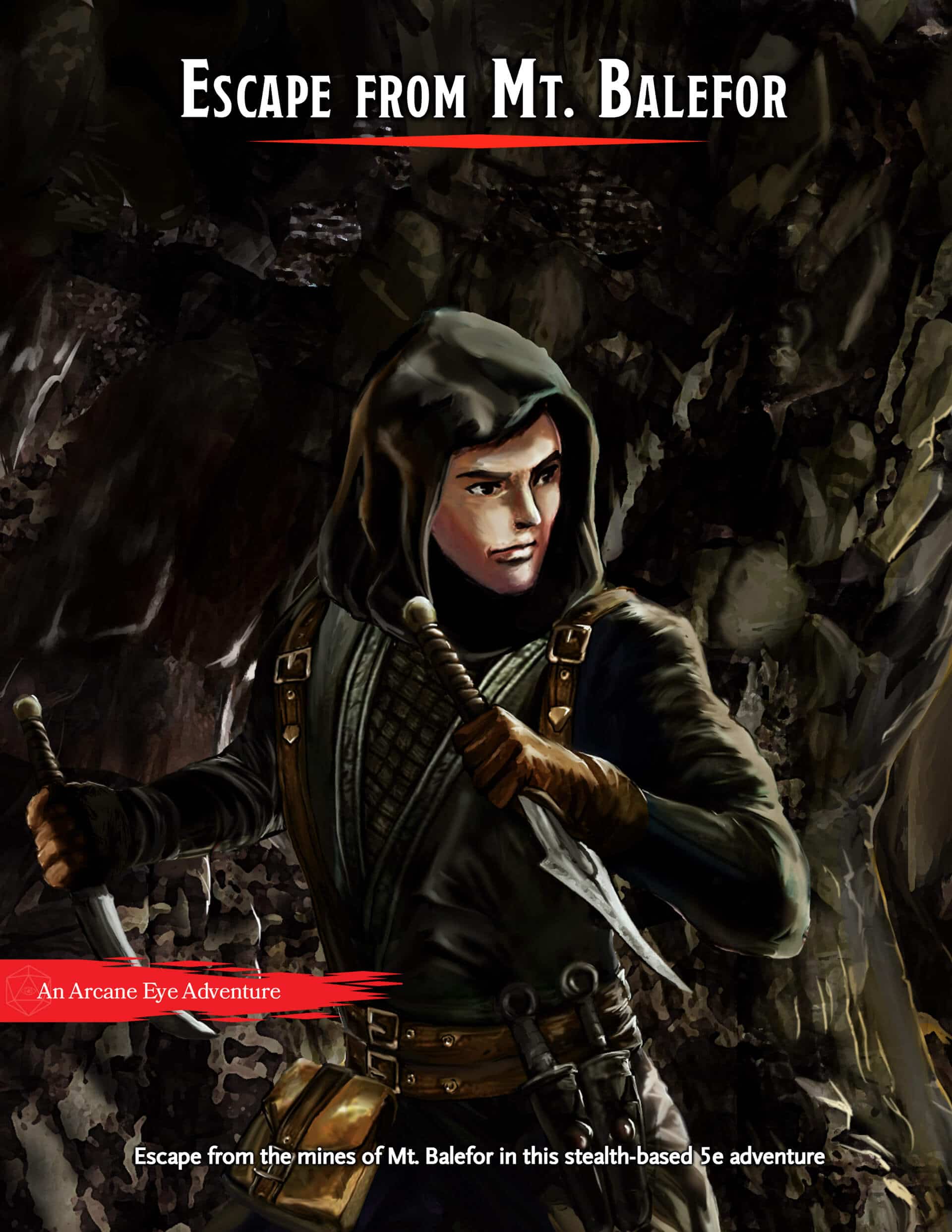Wild Shape 5e
Published on January 17, 2022, Last modified on March 2nd, 2024
Wild Shape is a versatile ability that can make your Druid effective in just about any situation. Whether you find yourself in a combat, stealth, exploration, or survival situation, there are ways to put Wild Shape to use. As we say in the business: “There’s a Wild Shape for that.”

Sam Guay - Wizards of the Coast - Wild Shape
Table of Contents
What is Wild Shape?
Wild Shape is a class feature for the DnD 5e druid that is gained at the 2nd level. This ability allows druids to use an action (or a bonus action if they are a Circle of the Moon druid) to shape change into a beast that they have seen before.
The form a druid can choose is limited by Challenge Rating (CR) and movement ability. Those with swimming and flying abilities are restricted to higher-level druids:
| Level | Max CR | Movement Ability |
| 2nd | 1/4 | No flying or swimming speed |
| 4th | 1/2 | No flying |
| 8th | 1 | No restrictions |
This table applies to all druids except those that have their Wild Shape ability modified by their subclass. An example of this would be the Circle of the Moon druid’s ability to choose higher CR beasts for their Wild Shape.
No matter what level the druid is, Wild Shape can be used twice per short or long rest.
What Changes When a Druid Wild Shapes?
While transformed, druids use the beast’s hit points, hit dice, Strength ability score, Dexterity ability score, Armor Class, movement speed, senses, attacks, and other features. Druids retain all sense of themselves while transformed, meaning they keep their Intelligence, Wisdom, and Charisma ability scores, as well as their alignment and personality.
All equipment being carried by the druid when they shape change either drops to the ground (not ideal), merges into the beast form, or is worn by the form. The equipment that can be worn by a form is entirely dependent on what is reasonable (decided by the DM).
Other class features that can be used by the new form are retained, with the exception of enhanced senses that are not shared with the beast form (Darkvision, tremorsense, blindsight, etc.). Examples of features that are retained would be feats that don’t alter physiology (see below).
Taking Damage in Wild Shape
The druid assumes the hit points of the beast they have transformed into. This means that if the druid had 30 hit points remaining and transformed into an ape, they would now have 19 hit points. When the Wild Shape ends, the druid will revert to the hit points they had when they initially transformed. If the druid takes more damage than hit points they have left in their form while Wild Shaped, the excess damage will be taken off the druid’s hit points.
This ability is what makes druids good tanks, even if they may not appear so at first glance. Very few 4th-level abilities are able to generate as many hit points as Wild Shape can.
Look at it this way, at 8th level, druids have access to 64 extra hit points if they use both Wild Shape charges to transform into brown bears. That’s 32 points of healing with an action, which is the equivalent of a 6th-level cure wounds. At 11th level, Circle of the Moon druids can access almost quadruple that by expending both their Wild Shape charges to transform into a earth elemental, which has 126 hit points.
Casting Spells in Wild Shape
Druids cannot cast spells in Wild Shape. This can be a bummer for a class that is built around casting spells, but there is a workaround. If a druid were to cast a concentration spell before they transform with Wild Shape, they are able to maintain concentration on the spell.
The go-to options for spells to concentrate on in Wild Shape are:
| Level | Damage Dealers | Buffs/Summons | Debuffs |
|---|---|---|---|
| 1st Level | N/A | N/A | Entangle, Faerie Fire, Hold Person |
| 2nd Level | Flaming Sphere, Heat Metal, Moonbeam | Barkskin, Healing Spirit, Pass without Trace, Summon Beast | N/A |
| 3rd Level | Call Lightning | Conjure Animals, Summon Fey | N/A |
| 4th Level | Wall of Fire | Conjure Minor Elementals, Conjure Woodland Beings, Guardian of Nature, Summon Elemental | Confusion, Dominate Beast, Polymorph |
| 5th Level | Wrath of Nature | Conjure Elemental, Summon Draconic Spirit | N/A |
| 6th Level | Sunbeam | N/A | N/A |
The Best Ways to Power Up Your Wild Shape
Best Class Features for Wild Shape
- Circle of the Moon: Circle of the Moon druids get a ton of buffs to their Wild Shape ability. This includes Wild Shape as a bonus action, access to higher CR beasts, and the ability to cast spells in Wild Shape at later levels.
- Barbarian/Monk Unarmored Defense: Because you’re not able to wear armor while in Wild Shape and you take on the beast’s Dexterity ability score, the best way to increase your Wild Shape’s AC is to multiclass into Monk/Barbarian.
- Barbarian Rage: The Barbarian’s Rage functions while in Wild Shape and can allow you to dish out more damage while gaining resistance to all non-magical bludgeoning, slashing, and piercing damage.
Best Feats for Wild Shape
- Alert: Being able to go first in initiative means you get into your Wild Shape quicker. Alternatively, you could cast a concentration spell with your first turn and then Wild Shape when enemies start to close in.
- Lucky: In general, martial builds get more use out of Lucky than casters. Because Wild Shape-focused druids are both, they will have plenty of opportunity for Lucky to come in handy.
- Magic Initiate: This will allow you to pick up Mage Armor, which is miles better than Barkskin. 8-hour duration, no concentration, lower spell slot.
- Resilient (CON): Another great option to keep your concentration up in Wild Shape.
- Sentinel: If you’re planning on tanking in Wild Shape form, Sentinel will come in handy. If you have squishy party members, this will net plenty of opportunity attacks. Be careful about making yourself a target because Wild Shapes have notoriously low AC.
- Telepathic: Doesn’t provide a power upgrade to your Wild Shape, but allows you to communicate with your party up to a range of 60 feet away.
- War Caster: Keeping your concentration up in Wild Shape is important. War Caster is a huge help with that.
Our friend Andrei created a Wild Shape Tracker for all of you animal-loving druids. This tool allows you to choose your Wild Shape, manage your hit points, and roll ability checks, attack rolls, and damage. You can check it out via the link below:Wild Shape Tracker
Best Wild Shapes List

There are tons of beasts available for druids to Wild Shape into. Unfortunately, not many are worth a precious use of your Wild Shape. Below is a list of the ones that are worthwhile, as well as when they really shine.
2nd Level | Max CR: 1/4 | No flying or swimming speed
- Cat: +4 to Stealth and +3 to Perception, make the cat great for scouting missions in many environments.
- Elk: Faster movement speed and more combat options than a draft horse. Unfortunately, it has 6 fewer hit points than the draft horse, which will actually matter at this low of a level. This Wild Shape is really only meant for travel.
- Giant Badger: Can Burrow at a speed of 10 feet and is one of the better damage dealers.
- Giant Wolf Spider: +7 to stealth, +3 to perception, Darkvision, Blindsense, and Spider Climb make this the best scout you can get at this level. Also does some of the best combat damage at this level.
- Velociraptor: The velociraptor offers the best damage at this level, but seeing as Wild Shapes are limited to creatures that you have seen, good luck with this one.
4th Level | Max CR: 1/2 | No flying
- Ape: Decent damage, climb speed, and a rare ranged attack.
- Crocodile: Awesome single target control and a swim speed. Can hold its breath for 15 minutes.
- Octopus: Good for stealthy underwater missions.
- Reef Shark: Only really useful if the 15 minutes you can spend underwater as a crocodile isn’t enough.
- Warhorse: Replaces the elk as the best travel Wild Shape. Great damage, trampling charge, and speed.
8th Level | Max CR: 1 | No restrictions
- Brown Bear: This might be a great Wild Shape for Circle of the Moon druids at 2nd level, but its AC makes it hard to be viable by 8th level. A great option if you are a Half-Orc Barbarian because of Savage Attack and Rage.
- Direwolf: Reasonable AC and hit points. Pack Tactics can come in handy if you have another melee fighter in your party, and a chance to knock the target prone with a Bite makes this the most viable melee combat Wild Shapes at this level.
- Giant Octopus: Great hit points, speed, advantage on Stealth, and a strong attack. This is the best water Wild Shape at this level.
- Giant Spider: The Web ability is alright but a DC 12 STR check is pretty low at 8th Level.
- Giant Toad: The Swallow ability makes the Giant Toad a pretty viable option against a single target sized Medium or smaller.
- Giant Vulture: Great fly speed and damage. Its AC and hit points leave something to be desired but the giant vulture is the most viable flying Wild Shape.
Wild Shape FAQ
Can a Druid talk in Wild Shape 5e?
No. Your ability to speak or take any action that requires hands is limited to the capabilities of your beast form.
Do Racial Traits Work in Wild Shape?
As long as the anatomy of the beast you Wild Shape into doesn’t alter the physiology required, you can use racial traits in Wild Shape.
Can You Cast Spells in Wild Shape?
No, but spells that have multi-turn durations remain active when transformed as long as concentration is maintained (if necessary). Spells like Flaming Sphere can still be activated as a bonus action when Wild Shaped.
